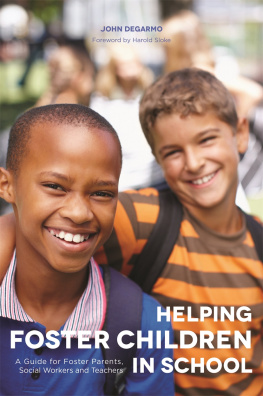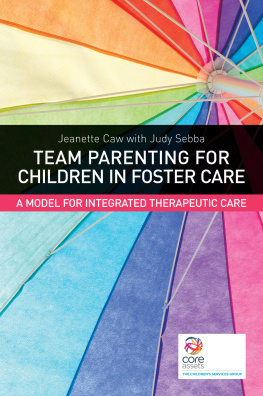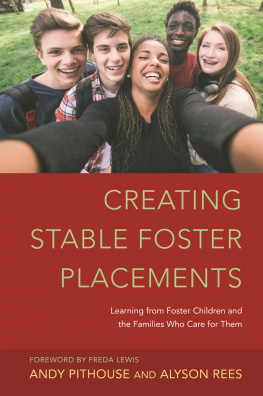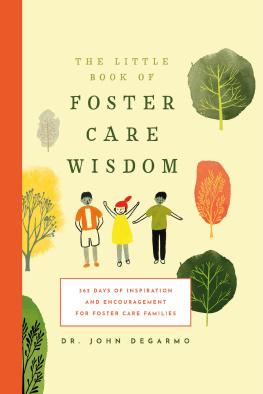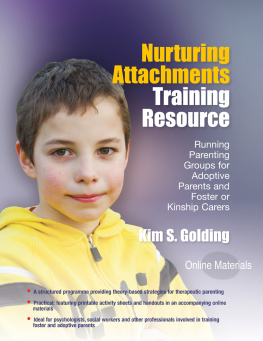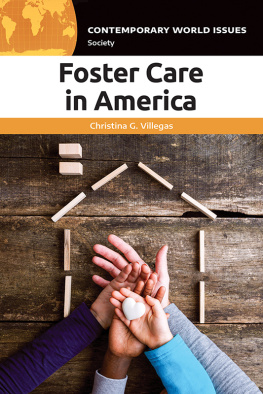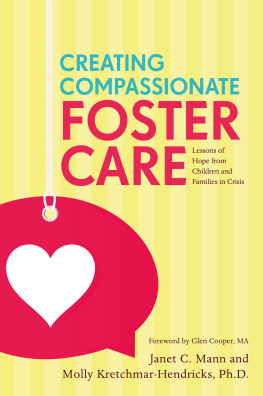
Nurturing Strangers
Nurturing Strangers focuses on loving nonviolent re-parenting of children in foster care. This book is a jargon-free mix of narrative and real-life case studies, together with the theory and practice of nonviolence. Nurturing Strangers and the authors previous book, Welcoming Strangers , are the first books to apply philosophies of nonviolence directly to the care of children in the foster care system. One of the many strengths of these books are that they are not merely theoretical, but rooted in the practice of nonviolence incorporated into work with children for over thirty years. Nurturing Strangers is for foster carers, caseworkers, case managers, social work students, and parents, as well as the general reader interested in children who have been victims of violence in and out of the foster care system.
Andrew Fitz-Gibbon , a Fellow of the Royal Society of Arts, is Professor of Philosophy, Chair of the Philosophy Department, and Director of the Center for Ethics, Peace and Social Justice, at the State University of New York College at Cortland. He is the author, co-author or editor of thirteen books.
Jane Hall Fitz-Gibbon works in crisis support with TST BOCES, and is involved with the Department of Social Services, co-leading courses on foster care, adoption, and child sexual abuse. Her latest book, Corporal Punishment, Religion and United States Public Schools , was published by Palgrave Macmillan in 2017.
This gem of a book is an insightful guide for all caregivers who want to be a positive influence in the lives of children. The authors share touching stories and practical advice from their lives as foster parents. Their enlightened approach is a beautiful testament of the power of positive parenting.
Tina McMechen , Acting Director, and Genevieve Rivera, Managing Director, American Society for the Positive Care of Children
Rather than simply being a list of shoulds and shouldnts, this book provides perspectives on the topic of re-parenting children who have experienced significant trauma and chaos. This book is not just an academic treatise. Its strength lies with its real-world view of working with these kids. Readers will walk away with a different perspective of the children they care for, and of themselves as caregivers. They will gain useful ideas for dealing with difficult situations, and they will gain an understanding that even when you do everything right, things may not always work out the way they would like. Knowing that might just help the exhausted, frustrated foster parent to provide the most nurturing environment possible.
Raymond D. Collings , Associate Professor, Psychology, State University of New York, Cortland
Nurturing Strangers
Strategies for Nonviolent Re-parenting
of Children in Foster Care
Andrew Fitz-Gibbon and Jane Hall
Fitz-Gibbon
First published 2019
by Routledge
52 Vanderbilt Avenue, New York, NY 10017
and by Routledge
2 Park Square, Milton Park, Abingdon, Oxon, OX14 4RN
Routledge is an imprint of the Taylor & Francis Group, an informa business
2019 Taylor & Francis
The right of Andrew Fitz-Gibbon and Jane Hall Fitz-Gibbon to be identified as authors of this work has been asserted by them in accordance with sections 77 and 78 of the Copyright, Designs and Patents Act 1988.
All rights reserved. No part of this book may be reprinted or reproduced or utilised in any form or by any electronic, mechanical, or other means, now known or hereafter invented, including photocopying and recording, or in any information storage or retrieval system, without permission in writing from the publishers.
Trademark notice : Product or corporate names may be trademarks or registered trademarks, and are used only for identification and explanation without intent to infringe.
Library of Congress Cataloging-in-Publication Data
A catalog record for this title has been requested
ISBN: 978-1-138-50316-8 (hbk)
ISBN: 978-1-138-50317-5 (pbk)
ISBN: 978-1-315-14525-9 (ebk)
Typeset in Bembo
by Swales & Willis Ltd, Exeter, Devon, UK
To our siblings
Sandra, Jenny, Spencer,
Jackie and Debbie
Welcoming Strangers , published in 2016, was intended to be the swansong to our foster care career. We had enjoyed the ride, hopefully done good in our small world, and had something to pass on to othersthe practice we had begun to term loving nonviolent re-parenting. The publication of the book, our sixth written together, was to mark our retirement from actively caring for children, though Jane had intended to keep in contact with our local foster carers and adopters through the support group she organizes. However, circumstances dictated otherwise. Not long after the publication of Welcoming Strangers , Kristen Monroe, Commissioner for Social Services of Cortland County, NYwho kindly wrote the foreword to this bookasked if we could conduct training for foster parents and caseworkers in nonviolent care. We readily agreed. Three courses, and a few more children later, with interest from another fourteen counties and agencies in New York, our involvement in foster care has taken a turn toward training others in loving nonviolent re-parenting.
Welcoming Strangers was part narrativetelling the journey of our work with children in careand part the application of the principles of loving nonviolence to the daunting task of helping children to heal from trauma caused by violence. We continue the format of story-telling and the application of principles in Nurturing Strangers. In Welcoming Strangers , we introduced the term re-parent to indicate that children in foster care have been parented already, often in inadequate ways. Our observation is that all children in care are victims of violence in one or several waysphysical, sexual, emotional, and systemic, and that this violence traumatizes children in different ways. Some seem to weather the storm better than others, but for most the effects of trauma can be seen in related behaviorwithdrawal, violence, stealing, and eating disorders, to name only a fewand in difficult relationships. Deprived of love, safety, and adequate nurturance in their birth homes, and exhibiting behavior readily thought of as naughty, with the associated label bad kid, children in foster care present a challenge to even the most experienced re-parents. Our approach to help children recover from trauma induced by violence has been to create a loving environment where intentional nonviolence is practied. Nonviolence is a way of living that seeks to reduce violence:
by refraining from violent actions;
by acting according to loving kindness; and
by seeking the good for the Other.
Though simple in the saying, intentional nonviolence requires a great deal of work on the part of the carers. Most of us, even those who have not been victims of violence, have internalized the view that violence works as a last resortthe myth of redemptive violenceand that this strategy will work with children too. Here we present a different approach rooted in our experience of caring for over thirty years, and based on good philosophical reasoning.
In writing Nurturing Strangers we would like to thank Kristen Monroe, Commissioner of Social Services, Allison Veintimilla, Director of Social Services, and their staff in Cortland County, NY, for the courage to adopt loving nonviolence in training carers and caseworkers; the advisory board of the Welcoming Strangers Project at SUNY Cortland; Tom Frank, and Liz Speziale from Research and Sponsored Programs; Leslie Eaton for analysis of the data from our courses; and Michael Emmart and Pam Talbott for help and support; Karla Alwes provided impeccable editing, and Craig Hanson gave us helpful comments on addiction.


